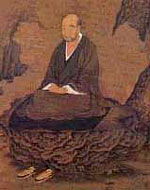Koso Wasan 41
The ocean of the inconceivable Name does not hold unchanged
The corpses of the five grave offences and slander of the dharma;
The myriad rivers of evil acts, on entering it,
Become one in taste with the ocean water of virtues.
The Light of Asia

English-speaking people of my generation probably had their first encounter with Sir Edwin Arnold's epic poem, The Light of Asia, during their childhood or adolescence. From this experience, our first impressions of the dharma were formed. The poem is deeply reverent and sumptuously written. It is very important because, as far as I know, it is actually the first verse that is concerned with the dharma to have been composed in English. In its scope, the poem is consistent with that of the Buddha Carita of Ashvagosa, which for more than two thousand years has been the principal written record of Shakyamuni's pre-enlightenment biography. Sir Edwin's work goes further than that of Ashvagosa because the Buddha Carita originally concluded at the time of Shakymuni's enlightenment; only in recent times have later features of his biography been added to the original text. However, Sir Edwin's intention was to convey something of Shakyamuni's teaching as well as his biography. For Ashvagosa, such additional material was obviated by the fact that the Triptika was already well-known and deeply studied.
Another feature of Arnold's work is that it has a rather humanistic emphasis, although much of its tone is also religious and devotional. Shakyamuni is portrayed as a mere human being to some extent, whereas, in fact - from the time of his enlightenment onwards - he repeatedly rejected any description of himself as being either 'a man or a god'. Shakyamuni himself always insisted that a Buddha belonged to an order of existence that had transcended both the human and the divine. Needless to say, it is to be expected that Sir Edward would reflect - and perhaps also cater for - the prejudices of his age. Had he presented the story and teaching of Shakyamumi in its original idiom his poem may not have had the immediate appeal that it actually had. It has sold millions of copies and has appeared in dozens of editions.
Sir Edwin Arnold was born in Gravesend, Kent in England on June 10, 1832 and he died on March 24 in 1904 in London. He worked for a time as a school teacher in India but returned to England to work as leader-writer on The Daily Telegraph. It was at this time that he composed The Light of Asia, which was completed in 1889. For a while he lived in Japan and his third wife was Japanese. Although he was not a Buddhist (his religion was Theosophy) he played a part in the Buddhist revival in Sri Lanka and is said to have been fluent in Sinhala. His understanding of the dharma is coloured by his primary interest in Shakyamuni (whom he called Gotama) as a great renunciate - a great ascetic - and as the person who had undoubtedly had the strongest influence upon Asian culture. The presentation of the poem as if it is being told by a devout Buddhist is, to some extent, an artistic contrivance; but what commends the poem to me is not only its remarkable pioneering status, or its wonderful verse, but its non-sectarian perspective. Sir Edwin was not interested in the fine details, which define the distinctions between sectarian claims to authenticity. This gives the poem a universality very like that achieved by the Bukkyo Dendo Kai in its ubiquitous publication The Teaching of Buddha. The poem can be read by any follower of the dharma without feeling alienated by its assumptions.
The Light of Asia is always most memorable in the last few lines, which I shall quote here: -
Ah! Blessed Lord! Oh! High deliverer!
Forgive this feeble script which doth thee wrong,
Measuring with little wit thy lofty love.
Ah! Lover! Brother! Guide! Lamp! Of the Law!
I Take My Refuge In Thy Name And Thee!
I Take My Refuge In Thy Law of Good!
I Take My Refuge In Thy Order! Om!
The Dew Is On The lotus! - Rise, Great Sun!
And Lift My Leaf And Mix Me With The Wave.
Om Mani Padme Hum, The Sunrise Comes!
The Dewdrop Slips Into The Shining Sea!
Shinran Shonin, too, found himself being absorbed - in spite of his karmic obstructions - as a 'drop of dew into the shining sea'. This superb metaphor is redolent with the liberation and joy that comes with the prospect that the end of the cycle of suffering in samsara is nigh. In Shakyamuni's life such a moment was the time of his enlightenment. In the way of nembutsu the dewdrop slips into the shining sea when the sun of Amida Buddha's faith awakens in the hearts of sentient beings and they join the stage of the truly settled: to become buddhas when their life in this world comes to an end.